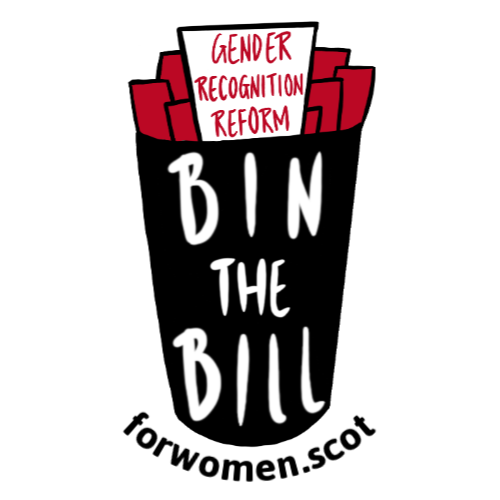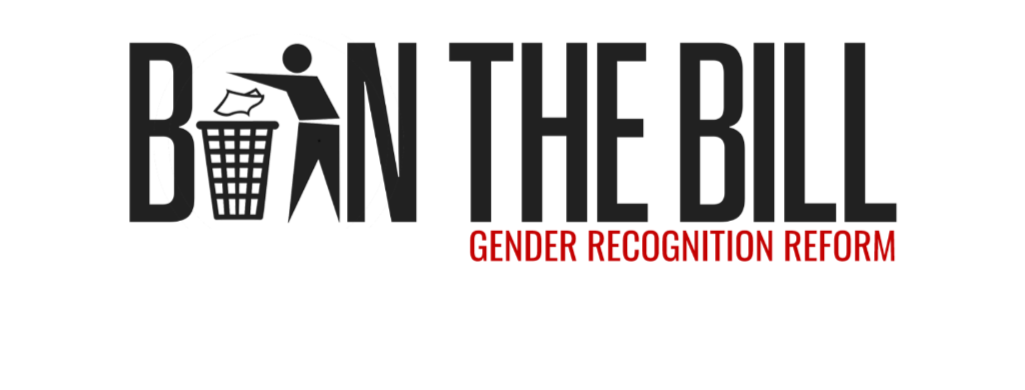Consultation Guidance – Archive
This page is a record of our campaign and guidance for the Scottish Government’s consultation on Gender Recognition Reform (Scotland) Bill, which ended on 17 March 2020.

The Government wants to know what you think about their Gender Recognition Reform (Scotland) Bill. This is our Quick and Easy Guide to filling out the consultation form. A downloadable version is available here. The deadline for responding is 17 March 2020.
First a little bit of background summarised from the 195 page consultation paper…
The current situation:
At the moment, a person over the age of 18 can change their legal sex if they have been diagnosed with a rare medical condition called gender dysphoria. This involves two doctor reports, documents (eg. utility bills) showing two years ‘living in role’, and costs £140 (which is means tested). A Gender Recognition Certificate (GRC) is then issued which permits a birth certificate to be reissued in the opposite sex.
What the Government wants to do:
Remove the requirement for a diagnosis of gender dysphoria and make a person’s sex a matter of self-declaration. Anyone, from the age of 16, will be able to sign a declaration stating they have “lived in the acquired gender” for the previous 3 months. There may be a small fee to lodge this document with the Registrar office. No medical treatment, no outward change in appearance or even a name change will be required. After a further 3 month “reflection period” a GRC will be issued, along with a new birth certificate in the opposite sex.
Why the Government wants to do this:
They admit there is no need to do this at all as our current legislation is fully compliant with European and international law. However, they have stated a wish to make the application process easier for transgender people. We have no problem with streamlining the system, but the Bill goes much further by opening up a new, and very simple, process to a much larger group of people than the original law ever intended – in fact it is open to everyone. There is no justification for anyone without gender dysphoria requiring a GRC.
The problems with the Bill:
Many transgender people do not agree with the proposed law change and are questioning why a Bill designed to meet their specific needs no longer even mentions them. They have concerns about accessing medical treatment if it is unlinked from the legal process, and share many of the same safeguarding concerns as women.
Basic terms in the Bill are not defined. It is important to understand what terms like “living in the acquired gender” actually mean, particularly when a new criminal penalty is to be introduced for making a false declaration about it.
The Government has failed to take into account evidence of problems arising in the few countries which have introduced laws based on the principle of self-identification of sex, for example violent male sex offenders who claim to be women transferred into female prisons, women’s refuges losing funding if they do not admit men who identify as women to their accommodation, or numerous men claiming to be women in order to take women’s political positions.
Despite promising to meet with grassroots women’s groups the Government failed to do so, meaning many women’s concerns were not taken into account when the Bill was written. One of the references (number 207) included in the consultation paper is to a document that states, in regard to the use of female changing rooms, a ‘woman’ with a penis is as much of a ‘non-normative’ woman as a woman with mastectomy scars – a view which many find offensive.
The crucial problem with this Bill is that it removes the biological meaning of ‘man’ and ‘woman’ in law. If the category of women also includes any man who wishes to be included, what does this mean for women’s rights?
It means that women’s rights become virtually impossible to uphold. Services you might like to be performed by a woman – like rape counselling, cervical smear tests, personal care for the elderly – could be delivered by a ‘woman’ who is actually male. Rapes and sexual assaults committed by males who claim to be women will be recorded as female crimes, and the perpetrators will be housed in women’s prisons. The pay gap between the sexes will be impossible to measure and males will take opportunities and jobs reserved by law for females. Males will be allowed to compete against females in sport.
Well-funded lobbying groups have already influenced changes in public policy ahead of this proposed law change, meaning self-declaration of sex already underpins policies relating to health, prisons and education. Some schools have removed single-sex toilets (which flouts current law on standards of provision) and NHS policies have led to an admission that a female health care provider is unable to be guaranteed, even when specifically requested. Male prisoners are already being housed in women’s prisons.
Scottish people do not want this Bill. In a recent independently commissioned national poll only 18% supported the introduction of self-declaration of sex. Transgender people already have a mechanism in place to change legal sex status but it is right and fair that a robust medical gate-keeping process is in place. This Bill proposes unregulated access to altering birth certificates and encroaches too far into our sex-based rights and laws – it’s time to speak up and say no – let’s Bin the Bill.
For further reading for those wishing to expand on the suggested responses below, please see MBM Policy Analysis (review of the consultation as a pdf), and Fair Play For Women’s articles What have transgender rights got to do with women and Is the GRC process too difficult.
So, let’s get started filling out the consultation…

Click here to open the consultation form in a new tab.
You can then look back and forth between this guide and the consultation form while you complete your response.
Question 1
Do you have any comments on the proposal that applicants must live in their acquired gender for at least 3 months before applying for a GRC?
Yes ✓
No ☐
If yes, please outline these comments.
This question is OPTIONAL. Please feel free to skip straight to Question 3.
If you choose to tick YES, we suggest a comment that the NHS say diagnosis of gender dysphoria is made from an in-depth assessment carried out by two or more specialists over a period of time, which takes longer than 3 months to complete thoroughly. The reforms would dramatically speed up the process of applying for a legal sex change, as well as removing all forms of gate-keeping designed to prevent abuse of a system that was originally intended to help a very small number of people with a rare medical condition.
Self-declaration of sex is not a principle that should be embedded in law and the Bill should be rejected in full.
Question 2
Do you have any comments on the proposal that applicants must go through a period of reflection for at least 3 months before obtaining a GRC?
Yes ✓
No ☐
If yes, please outline these comments.
Again, this question is OPTIONAL. Please feel free to skip onto Question 3.
If you choose to tick YES, we suggest a comment that the current thorough medical process should be retained to ensure a person considers the full ramifications before signing any legal documents. The reforms would dramatically speed up the process of applying for a legal sex change, as well as removing all forms of gate-keeping designed to prevent abuse of a system that was originally intended to help a very small number of people with a rare medical condition.
Self-declaration of sex is not a principle that should be embedded in law and the Bill should be rejected in full.
Question 3
Should the minimum age at which a person can apply for legal gender recognition be reduced from 18 to 16?
Yes ☐
No ✓
Don’t know ☐
If you wish, please give reasons for your view.
We would tick NO and here’s why:
Young people who wish to be the opposite sex are frequently placed on an experimental medical pathway which leads to loss of sexual function, infertility, and lifelong medication. Current research shows that, for the vast majority of children, these feelings of gender dysphoria resolve with maturity. The causes for both the rapid increase in children seeking medical help and detransitioners (those who return to their original sex having been through the medical route) needs to be investigated before any law change extends the right to legally change sex to young people.
Further reading: Research indicates the brain does not fully mature until at least the age of 25
Question 4
Do you have any other comments on the provisions of the draft Bill?
Yes ✓
No ☐
If yes, please outline these comments.
We would tick YES and here’s why:
The Bill should be rejected in its entirety as the consultation paper (section 2.13) states our current legislation fully meets European law and there is no requirement for it to be reformed. There is absolutely no justification for allowing someone to switch the sex on their birth certificate without a medical diagnosis of gender dysphoria. Only people with this rare medical condition and who have been through a sincere, professionally monitored medical process should continue to have this right.
The Government has failed to take into account the consequences of changing the meaning of ‘man’ and ‘woman’ from a biological definition to one based on a self-declared feeling. There is plenty of evidence that taking this stance has already been detrimental to women’s and children’s rights.
Question 5
Do you have any comments on the draft Impact Assessments?
Yes ✓
No ☐
If yes, please outline these comments.
We would tick YES and here’s why:
The Impact Assessments are not fit for purpose. They do not follow the Scottish Government’s own standards of looking at the possible consequences of any law or policy change, and incorrectly state this Bill will have no adverse impact on the female sex. They are not thorough, comprehensive or evidence-based.
All that’s left to do is click continue to the next page and enter your name, email address, tick that you are responding as an individual, and select your country of residence, and your privacy choices. Click continue, skip through the evaluation questions and then Submit Response.
THANK YOU!
Follow us @ForwomenScot on Twitter to keep up-to-date with news about the consultation.
Please feel free to use the following images on social media:

Twitter profile picture.
Right click the image and select ‘Save image as…’
This pic can be used on Facebook too – just use the slider to reduce the size once uploaded.

Twitter header photo.
Right click the image and select ‘Save image as…’

Facebook cover photo.
Right click the image and select ‘Save image as…’
